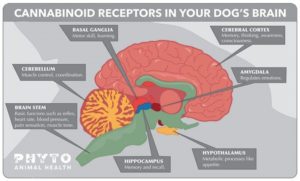
CBD & Animals
Cannabis can be used for animals. The endocannabinoid system was discovered in primitive animals from over 600 million years ago and in all mammals, birds, fish and reptiles today.


The animal endocannabinoid system works and acts the same as it does in humans. Thus, the same phytocannabinoids will act and have the same effect as it would in humans as animals but much more dose related.
Recent cannabinoid research has shown that cannabinoids have had beneficial efficacy in many conditions for both humans and pets:
Anxiety
Anxiety in pets can be disruptive as well as debilitating. Areas of the brain rich in CB1 receptors are known to be involved in mood stress and fear. CB1 receptors are known to mediate fearfulness and anxiety. Mice bred with no CB1 receptors are mice that have their CB1 receptors blocked showed constant fear anxiety. In contrast, cannabinoids boost CB1 receptors and produce a calming effect. Recent studies show that CBD exerts and inherent anxiolytic effects both in rodent models and humans. It also has been shown to reduce social phobia and anti-panic effects.
Aging
Pets as well as humans suffer mental decline with aging. Cognitive Dysfunction Syndrome in animals correlates to human Alzheimer’s disease. People with Alzheimer’s exhibits drastically reduced functioning of the cannabinoid receptors in the brain and have increased plaque deposits and microglia, which causes inflammation. Multiple cannabinoids exhibit neuroprotective, anti-inflammatory and antioxidant properties that maybe important in protecting nerve cells. Studies in rat plaque models injected with cannabinoids showed improved tests of mental ability and their brains had reduced microglia and inflammation. New studies show that CBD helps regenerate new neurons in the part of the brain responsible for memory. Animals with memory loss were given CBD and experienced memory improvement.
Arthritis
Pets suffer from both osteoarthritis (associated with aging) and rheumatoid arthritis (associated with autoimmune disease). In both types of arthritis, CBD reduces inflammation and pain to decrease symptoms. CBD acts as both an immunosuppressant and anti-inflammatory factor to protect the joints against severe damage and to inhibit the release of tumor necrosis factor that causes joint inflammation and destruction. Other cannabinoids also may show anti-inflammatory properties.
Inflammation
Dogs and other pets can suffer from a variety of inflammatory diseases. Inflammation is now recognized as the underlying basis of many diseases. CB2 receptors appear to be critical targets for regulating inflammation, and cannabinoids have been shown to be effective in suppressing inflammation all over the body. Cannabinoids suppress inflammatory responses, and thus lessen disease symptoms.





